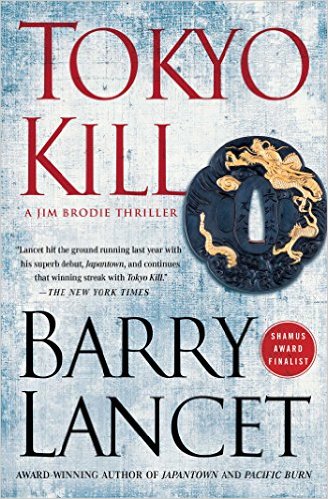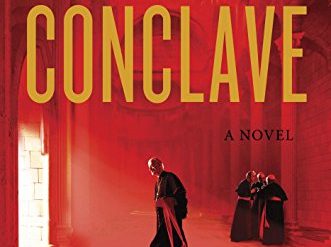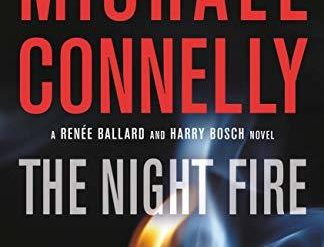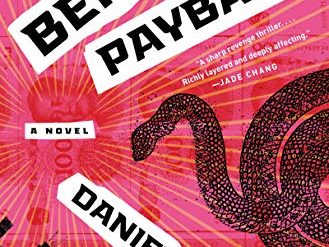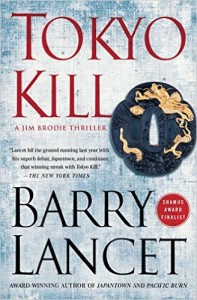
What is it about Americans’ hunger for violence? Recently, more than 100 million of us watched the Superbowl, a classic annual gladiatorial display in which huge men appear onscreen appearing to do their utmost to injure one another — and are rewarded with enormous sums of money for doing so. I’ve never understood why anyone would spend hours mesmerized by flickering images to witness this mayhem. So, when I come across repeated instances of gratuitous violence on the printed page, I cringe. All of which explains why I found it very difficult to read all the way to the end of Barry Lancet’s Jim Brodie mystery, Tokyo Kill.
Estimated reading time: 3 minutes
So, why did I read this book to the end?
The reason why I drove myself to finish Tokyo Kill is simple: in other respects, it’s an excellent piece of work. Lancet writes reasonably well. He is a long-term resident of Japan and clearly has studied a great deal about its history and culture. His novel sparkles with engrossing detail about the country’s storied past and with insight about its culture today (although at times the digressions to explain the finer points do become tedious). And he clearly knows how to craft a thriller, creating a deep sense of mystery, suspense, and surprise. None of this bothered me. It was all the guts and gore splashed across the page that had me retching.
Tokyo Kill (Jim Brodie #2) by Barry Lancet ★★★☆☆
Introducing Jim Brodie
The protagonist in Tokyo Kill is Jim Brodie, the central character in what is now a series of three novels. Brodie is a fascinating character. In San Francisco, he owns and runs a small, struggling antique shop specializing in Japanese art and artifacts. He has also inherited a 50% share in Brodie Investigations, a firm his late father founded in Tokyo. Brodie divides his time between the two cities. As he was raised in Tokyo, he is bilingual, and he is proficient in Japanese martial arts. In fact, he is uncommonly tough.
That comes in handy when people try to kill him, which happens with unnatural frequency in the course of the novel. In fact, those attempts, which nearly succeed, subject Brodie to such a degree of physical damage, pain, and suffering that I find it difficult to understand how he could have survived the experience, much less risen from his hospital bed only hours later to seek out more punishment.
Tokyo, front and center
Brodie is in Tokyo tending to affairs at the detective agency that bears his name. A middle-aged “salaryman” bursts into the office demanding to speak with him, the man’s aging father in tow. The father, it develops, is 96 years old. He was a Japanese officer in Manchuria following Japan’s notoriously brutal invasion in 1937. Now, his old comrades are being murdered, one after another, and he fears for his life. Though his son disbelieves the threat, he hires Brodie Investigations to protect the old man. Naturally, additional murders follow. And therein lies the tale.
About the author
Barry Lancet has lived and worked in Tokyo for a long time. He was employed by one of Japan’s leading publishing houses for 25 years, “developing books” that were mostly about Japanese culture.
For more reading
You might also enjoy my posts:
- Top 10 mystery and thriller series
- 20 excellent standalone mysteries and thrillers
- 30 outstanding detective series from around the world
- Top 20 suspenseful detective novels
- Top 10 historical mysteries and thrillers
And you can always find my most popular reviews, and the most recent ones, on the Home Page.

